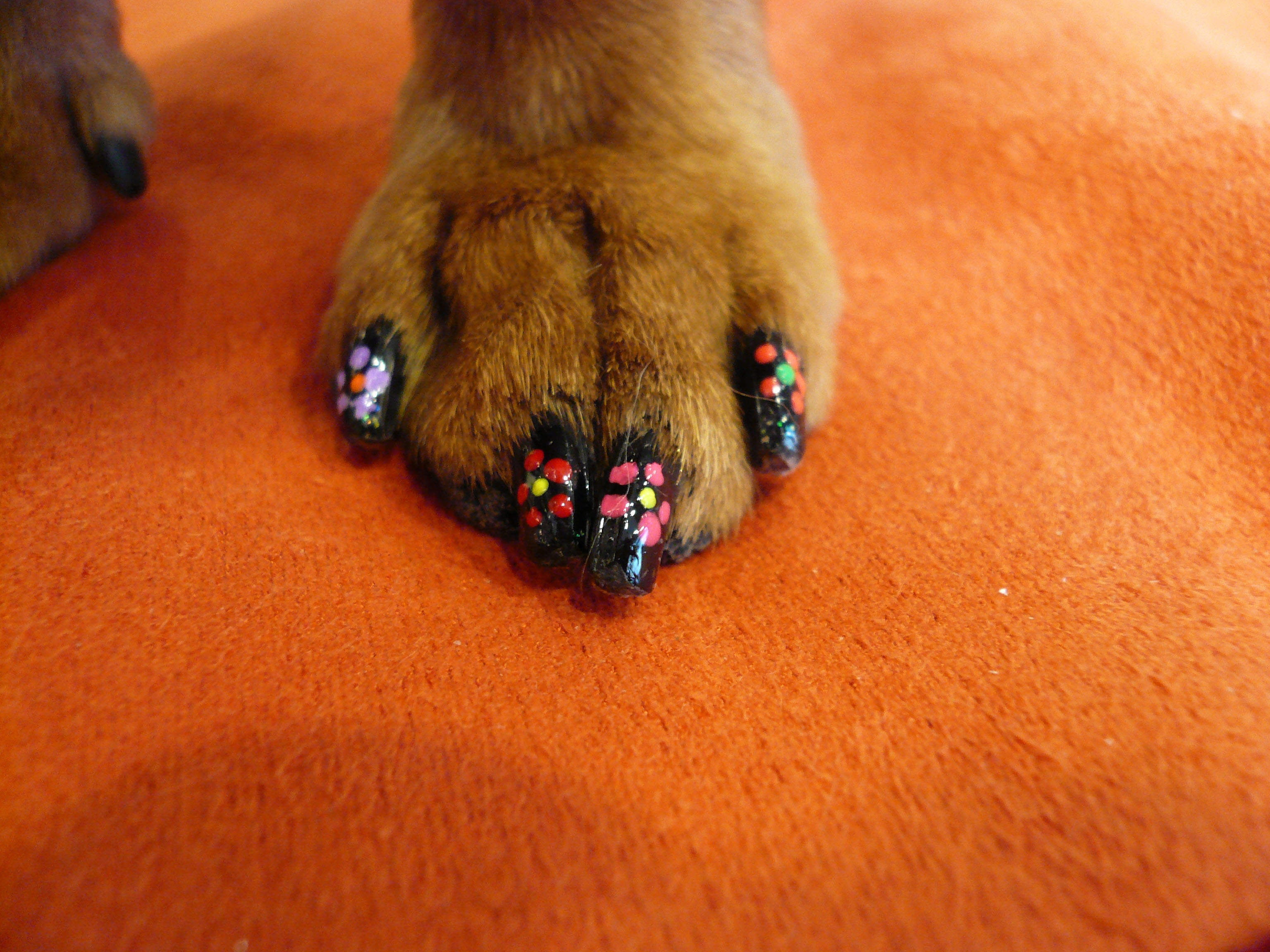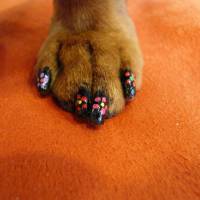Dear Alice,
Don't you think it's time you did a column on the crazy pet products and services available in Japan? I can't believe the lengths some dog owners go to — dressing their pets in frilly clothes, pushing them around in baby carriages and taking them into cafes. My wife says I'm crazy but I swear I saw a dog coming out of a beauty salon with its claws done up with nail color! So, what the heck is that? A pet-i-cure?
J.J., Tokyo
Dear, J.J.,
Your eyes weren't deceiving you. It is indeed possible to hire a professional to pretty up pooch paws with nail polish and glue-on stones. The service to ask for is doggu neiru arto ("dog nail art") or sometimes just doggu neiru ("dog nail"). That is of course wasei eigo (made-in-Japan English), and it's worth knowing that the Japanese word "neiru" applies only to nails with decoration. Unadorned nails, whether human fingernails or animal claws, are just plain tsume.
A number of pet groomers in Japan now offer claw decoration, with prices varying by shop and the level of detail desired. Tokyo-based "dog beauty artist" Eiko Sase, who did the paw in the photo accompanying today's column, charges between ¥3,000 and ¥5,000 for front and back paws together. A common request, she said, is to give a dog and its owner matching nails, usually for a party or special event.
That level of discretionary spending is remarkable when you consider that there was virtually no pet industry in Japan 50 years ago, according to Nobuaki Yanagihara, a pioneer in the Japanese pet business and chairman of the Japan Pet Products Manufacturing Association. I met with Yanagihara at the association's annual trade show, Japan Pet Fair 2012, which was held at Makuhari Messe in late March.
Spending on pets has now risen to roughly ¥138 billion ($1.6 billion), according to JPPMA figures posted at the show. Dog products are by far the most important category, accounting for roughly ¥89 billion in sales, followed by cat goods (¥24 billion), equipment and supplies for ornamental fish (¥17 billion) and small animals like rabbits and hamsters (¥2.8 billion). Stag beetles and bell crickets are also popular pets, and insects are a category all on their own (¥1.8 billion).
"Nowadays it's quite common to see owners who lavish their pets with expensive products and services," Yanagihara told me. "Many owners treat their pet like their child or partner, and often even better. But this is behavior that developed largely within one generation."
That comment brought me back to my first stay in Japan in 1979, when I didn't know anyone who kept a pet indoors. A family I visited in Hokkaido had a dog, but it was kept outside and brought into the tiled entrance way of the house only to receive its dinner. I remember how surprised I was to see it given a bowl of rice with miso soup poured on top, with bits of leftover fish and vegetables mixed in. "That was common then," Yanagihara confirmed. "Pets were fed on leftovers, and the idea of bringing an unclean animal into the home, particularly onto tatami mats, was still unthinkable for most people."
After the interview, I roamed the trade-show floor to get a feel for the industry. One obvious trend was a proliferation of so-called "cool goods," a category of products normally targeted at humans, which are supposed to help you keep your cool when things get hot. With the prediction that we're in for another hot summer with inadequate electric supply, exhibitors were offering all sorts of products to keep pets from overheating. There were raised sleeping platforms that allow air to circulate, and high-tech mats that draw away body heat and feel cool to the touch. I saw a jaunty gel-filled neck scarf for dogs, touted as a necchū taisaku (means of preventing heat-stroke), and there was plenty of ice cream, all formulated and packaged especially for dogs.
Speaking of treats, Japanese pets must be doing a heck of a lot of between-meal snacking, because last year, dogs alone consumed some ¥36 billion in snacks. I saw an amazing array of pet snacks, all beautifully packaged, ranging from strawberry-flavored nibbles for rabbits to low-fat chicken strips for dogs. There's even a new category of mini snacks for mini dogs, reflecting the growing popularity of chōkogata-ken (ultra-small dogs). Three of the smallest breeds — chihuahua, miniature dachshund and toy poodle — now account for half of all new dog sales in Japan, as buyers seek dogs suited to life in cramped urban apartments.
Those tight living quarters are also driving the market for odor-control products, according to Junichi Yamane, head of development and planning at Japan Pet Design Co., who told me Japanese consumers dislike opening their apartment door and getting hit with pet smells. And odor is more of a problem now that a growing number of owners have their dogs do their business indoors on disposable absorbent sheets. Sometimes this is because owners don't want to walk their pets, but in densely populated urban areas it's considered better manners to have your dog pass its wastes at home rather than in a public space.
Another cause of pet smells is the oxidation of skin oils, and many dog owners are opting for more frequent shampooing, particularly if they own a small dog they hold close to their noses. Products with herbal and floral scents that mask the dog's smell are popular, as are aromatic bath salts suitable for both humans and dogs so owners can take their pets into the tub with them.
I met a representative from the European pet industry who shook his head at such products. "More and more, it seems like Japanese owners want their dogs to be less like animals and more like people. They want their dogs to eat like people, dress like people and even smell like people. You have to admit, that's pretty bizarre."
It does give one paws.
For more photos of dog manicures, and information on other wacky pet products and services in Japan, please see my blog at alicegordenker.wordpress.com. Puzzled by something you've seen? Ask away to [email protected] or A&E Dept., The Japan Times, 5-4, Shibaura 4-chome, Minato-ku, Tokyo 108-8071.




















With your current subscription plan you can comment on stories. However, before writing your first comment, please create a display name in the Profile section of your subscriber account page.